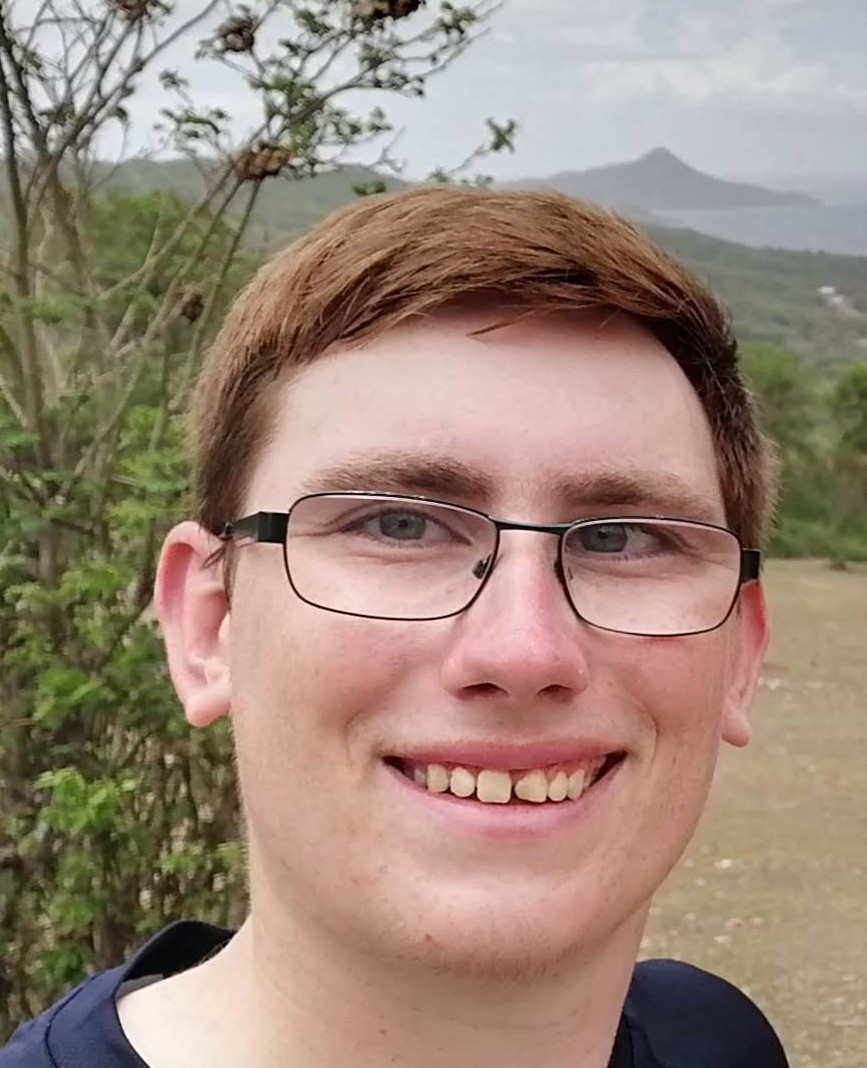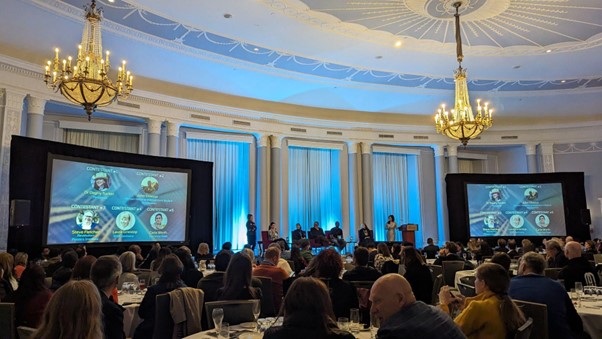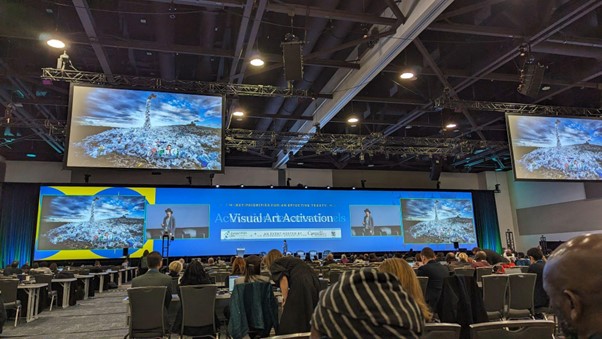
As negotiations resume to build the first global, legally binding treaty on plastic pollution, Sam Winton returns to provide on-the-spot insights throughout the week, uncovering the issues driving the debate in Ottawa and the sticking points that still stand in the way of progress.
I have arrived in Ottawa ahead of the critical fourth session of the Intergovernmental Negotiating Committee to Develop an International Legally Binding Instrument on Plastic Pollution, Including in the Marine Environment (INC-4), taking place over 7 days from the 23-29 April.
As we move on from an ultimately disappointing end to the 3rd session in Nairobi where the committee failed in the final hours to agree a mandate for intersessional work, we come to Ottawa with a clear task ahead of us. There is no time for further delay and we must now make urgent progress towards developing a treaty.
I have spent my initial days in Ottawa working with the team at the Revolution Plastics Institute to deliver an event targeted at negotiators titled ‘Demystifying Reuse’. The event, developed across a multi day workshop with experts from academia, industry, NGOs and government, shared key considerations for how measures to support reuse could be incorporated into the treaty, inviting attendees to participate in the premiere of our new game show, Reuse 101. After an incredibly interesting few days it is now time to turn to the main event of the week and I am writing this blog on the eve of INC-4 negotiations commencing.

Before proceeding with INC-4 it is important to take stock of where we are at the start of the week. We now have just 14 days of negotiations remaining to deliver a treaty by the end of 2024 and it could not be more critical that significant, urgent progress is made. However, a lack of intersessional work, no call for member or observer submissions, and a limited number of official webinars has meant that, if the intersessional period has been at all notable, it is for its lack of significant action, at least in an official capacity. Indeed, at the highly anticipated UNEA-6 in February, where many had anticipated the global plastics treaty would be a key topic of discussion, no significant developments in the process occurred. If you were not paying close attention, you could be forgiven for believing that little progress has been made in the last 4 months. However, informal meetings of groups of members have been occurring and the Chair’s Scenario Note makes it clear that he has received notification from several of these groups that they have been working to find consensus and streamline sections of the revised Draft text. These suggestions will be heard once the session’s substantive work commences and there is hope that this could significantly reduce the number of options in the text, addressing the severe bloat which currently exists in the 70 page document.
Many stakeholders have also provided updates to their thinking ahead of the session and a number of pre-session events have already taken place in Ottawa. These have included numerous informal side events, an observer’s dialogue with the chair and secretariat, and a partnership day hosted by the Government of Canada at the INC-4 venue where stakeholders were provided the opportunity to express their views. In continuation from INC-3, certain consistent arguments are being made by observers with minimal opposition. These include the need to ensure a just transition and a clear need for legally binding measures underpinned by globally mandated targets, avoiding a Paris style voluntary approach. While these viewpoints are not new, it is pleasing to see that, despite time pressures, NGO’s, academia, businesses and other stakeholders are still resolute in calling for these critical measures. One key point where division still exists among stakeholders is the role that industry should play in the negotiations, with some voices arguing for their complete exclusion, and others believing that business must be part of the solution to a problem they have caused.

There are 2 key messages that are being heard at the current time:
- In light of the time pressure the process is now under, stakeholders including the Scientists Coalition, Business Coalition, EIA, are now calling for a start and strengthen approach to the treaty. This reflects a common desire to achieve a treaty by the end of 2024, while acknowledging the deep divisions which exist between members, making it unlikely that agreement can be reached on all issues. At the Partnership day, Carroll Muffett, President & CEO, Center for International Environmental Law (CIEL), drew comparisons with the successful Montreal Protocol which adopted a start and strengthen approach, and the United Nations Framework Convention on Climate Change which has been plagued by inertia as members have failed to agree legally binding targets. In common with a start and strengthen approach, stakeholders are calling for members to prioritise discussions on provisions which are particularly critical (WWF), or where alignment already exists (Business Coalition) to ensure that, at a minimum, these provisions can be agreed by the end of 2024.
- While the Draft Rules of Procedure continue to be applied there is a clear and ongoing risk that, as seen in the closing hours of the 3rd session, members who do not want an ambitious treaty will continue to stall the process. While no one wants to see the opening days of the session taken over by discussions on Rules of Procedure, stakeholders are similarly reluctant to see this issue drag into the final hours of INC-5 in November (EIA). CIEL note that the Draft Rules of Procedure as provisionally applied grant all members an effective veto on discussions, holding the treaty down to the lowest common denominator. This is a situation that is becoming increasingly untenable and, despite the Chair’s intention to continue to apply the draft Rules of Procedure, as set out in his Scenario Note, it is possible that this issue will be a key feature of the session’s opening days.
As a final reflection, time is of the essence and the process can only progress if all members and observers play their part. The EIA note that ‘Sufficient time was spent at INC-3 hearing all views and even re-visiting some already agreed elements … From this point on, we can move forward towards more robust good-faith exchanges about the obligations and implementation measures’. Furthermore, the Chair’s Scenario Note requests that members refrain from making individual statements in the opening plenary to allow the process to proceed with substantive matters. We now need members and observers to cease using their time to express well established viewpoints and instead use their opportunity to reflect on the state of the negotiations as they stand and make constructive, timely inputs to progress the draft text. If all members and observers can commit to doing this I remain hopeful that we can deliver an ambitious, legally binding treaty by the end of 2024.
As was the case at INC-3, I will be providing regular updates over the course of the week. This will commence with my reflections on the first day, with further updates approximately every other day. At this INC my reflections will be heavily focussed on the key issues, challenges and progress made over the 2 day period each blog covers. For those looking for a detailed play by play of each day’s discussions I encourage you to look at the ENB’s daily summaries.
BIO
I am a postgraduate researcher working for the Revolution Plastics Institute at the University of Portsmouth since its creation in 2020. In 2023 I commenced my PhD studies titled ‘To what extent has the structure and implementation of the INC process facilitated the development of an effective Global Plastics Treaty?’ at the University of Portsmouth and the University of Surrey. This research will focus on how the structure and implementation of the INC process impacts the treaty’s outcome, consider how the inclusion of stakeholders in the process influences a fair and just treaty, and investigate the implications of the final text for members. With a background in environmental hazards and community preparedness, my main research focus is working with communities and a broad range of stakeholders to tackle environmental challenges. I have also conducted work with international organisations with a view to creating policies to tackle the global plastics problem, and facilitate sustainable development.

Great post thank you for sharing Filing Income Tax Return in Delhi